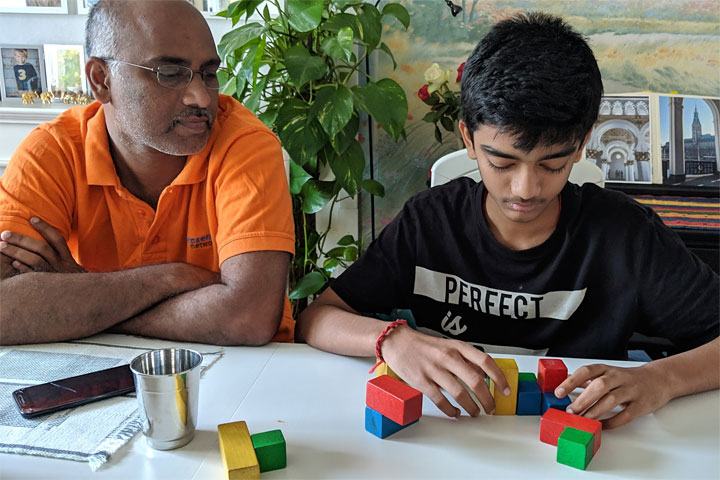


The picture above shows 12-year-old grandmaster D. Gukesh in April this year in my home in Hamburg. On the left, watching, is his father Rajnikanth, an ENT surgeon from Chennai, India. What is Gukesh doing? Well, he is aquainting himself with the Soma Cube, a little puzzle toy with which I have spent a lifetime playing. Gukesh had just completed the Baden Baden GM tournament, where he had come equal first – after making his GM title three months earlier, at the age of twelve years and seven months, missing the all-time record set by Sergey Karjakin in 2002 by a few days. If you look at his ChessBase Player Profile you can see how he achieved that (and play through some of his most interesting games).
India is currently witnessing a chess boom like nowhere else in the world. I toured the south of the country in January this year (2019) and met half a dozen chess talents who all had what it takes to become World Champions. None was over fourteen years old. I am pretty sure that in ten years from now the World Chess Champion will be Indian, there will be (at least) three Indian players in the top ten list, and over 50% of all active rated players in the world will be Indian.
Recently we (ChessBase + ChessBase India, together with Internet service provider Microsense) arranged a chess camp in Geneva for six top talents to train with former World Champion Vladimir Kramnik. In the breaks – at breakfast or in the evening – I gave the kids logical problems to solve. It was part of a project I have undertaken: trying to determine whether exceptional chess talents are better at working out logical problems than normal kids – or equal, or perhaps worse. In this endeavour psychologist friends have urged me to use one standard problem (and not an assortment) so I can reach a valid conclusion. I will report on the results when I have a larger sample.
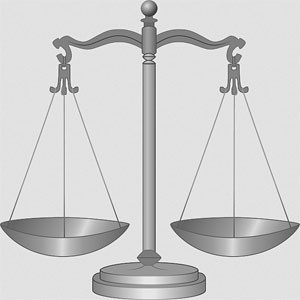 The problem I have chosen is one involving weighing with balance scales (I have to keep a picture ready since today's kids sometimes don't know what that is). The problem is as follows:
The problem I have chosen is one involving weighing with balance scales (I have to keep a picture ready since today's kids sometimes don't know what that is). The problem is as follows:
You have three coins. All look alike, but one is slightly heavier than the other two. How often must you weigh the coins on the balance scales to find the heavier one?
That is not too difficult, and many kids get it right very quickly. But then I ask: How many times must you weigh to find the one heavier coin amongst four? Amongst Five? Six? Seven? Eight? Nine? Ten? Twenty-seven?
Perhaps I have got you hooked, just like the kids in the following picture – and many other people as well. But do me a favour and do not post the solutions in the feedback section at the bottom – just whether you figured it all out, and what you think of the problem. We do not want to spoil the fun for other readers. I will give you the solutions in a separate article shortly.
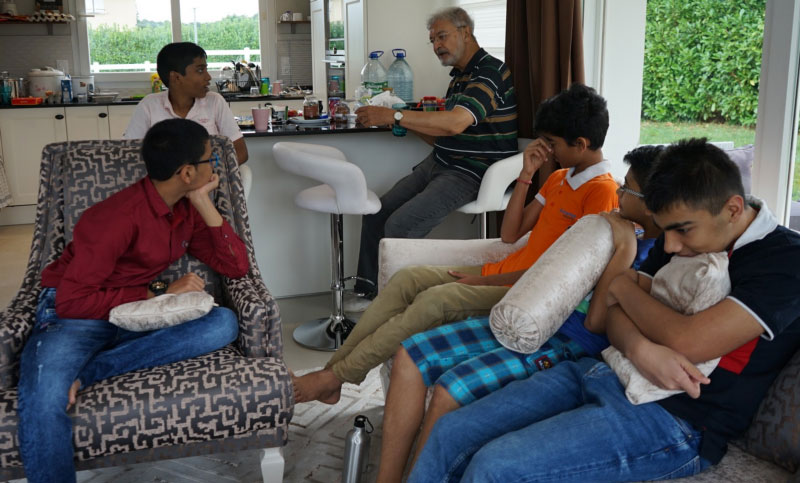
In the above picture you see the super-talents in Geneva puzzling over the weighing problem. In the background, talking to me, is fourteen-year-old grandmaster R. Praggnanandhaa who, a couple of weeks ago, stunned the chess world by becoming the World Youth Chess Champion in the Under-18 section.
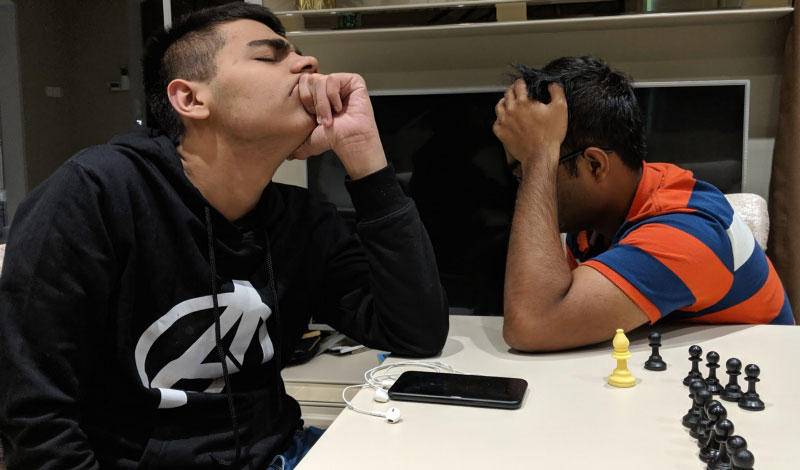
Oh the suffering! GM Prithu Gupta (left) from New Delhi, who in March this year last month became India's 64th grandmaster, and sixteen-year-old GM Iniyan Panneerselvam (right), India's 61st grandmaster. Iniyan was the quickest at solving the weighing puzzles (see video at the bottome of this page)..
Camp Kramnik was not the first time I had confronted talented young chess players with logical and chess problems. At the Mumbai GM tournament last January I gave a dozen young players the well-known Friedel Talent Test which I have used to identify top talents for decades now. It is a chess ending that is easy to dictate: kings on c8 (white) and a7 (black), white pawns on b5 and h2, black pawns on a6 and b7. Of course they have to solve it without pieces on the board. I gave the problem to Gukesh and Savitha Shri, a former U12 World Champion and many-times national champion in her age group in India. They solved it in a minute or two.
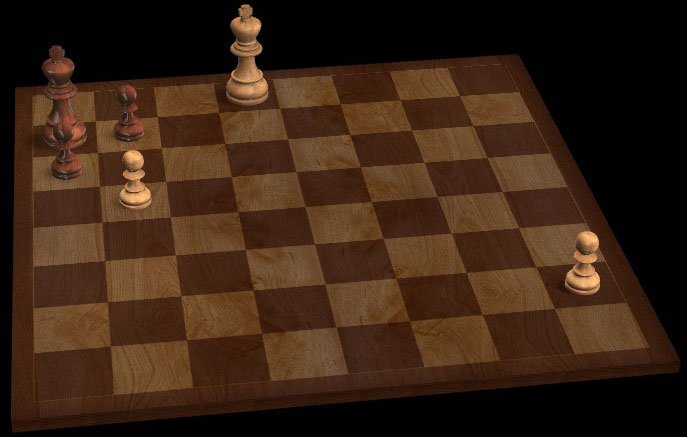 Then I gave them the real problem: move the white king to d8 in the initial position. If you belong to the tiny minority of people who do not know the problem you might want to give it a try: click on the image to expand and then try to find an irrefutable win for White – in your mind!
Then I gave them the real problem: move the white king to d8 in the initial position. If you belong to the tiny minority of people who do not know the problem you might want to give it a try: click on the image to expand and then try to find an irrefutable win for White – in your mind!
Generations of young talents have puzzled over this problem, and I have kept track of the solving times of dozens of them. If you are interested in the history of my Talent Test: I narrated it to Sagar Shah (CEO of ChessBase India), who cornered me at breakfast in Bangalore, set up his video camera and made me tell the full story. Alternately you can read my report Young talents and preteen GMs, which also tells the tale.
Gukesh solved both problems in his mind in five or so minutes (and confessed he had seen something like it before), while Savitha stood there for half an hour trying to solve the second. A number of other kids did likewise. But I'm afraid that is the end of my talent test. In Mumbai, I saw many young players independently puzzling over it on chessboards — the super-talents had rushed off to show the puzzle to their friends. So in the future when I meet a budding young player and say: "I want to give you a puzzle to solve..." they will probably answer: "You mean the 1.b6+ talent test?" Well, it has served me nicely for almost forty years, with hardly any top player who has not been confronted with it.
But back to logic: in the above video (from the Sagar Shah interview) we see Gukesh and Savitha working on the weighing puzzle – Savitha was quicker than Gukesh, as he readily admitted in a YouTube interview.
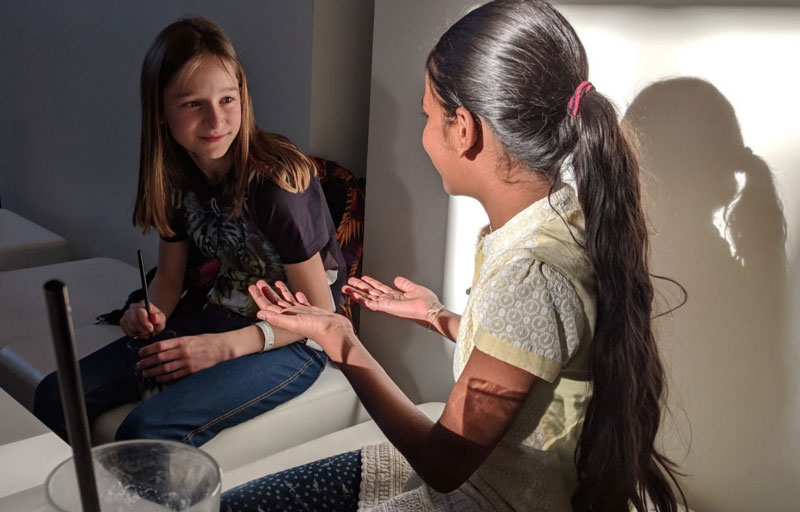
This is Savitha showing the problem to a young German chess player, Cecilia Keymer. Her brother Vincent is the greatest chess talent we currently have in Germany.
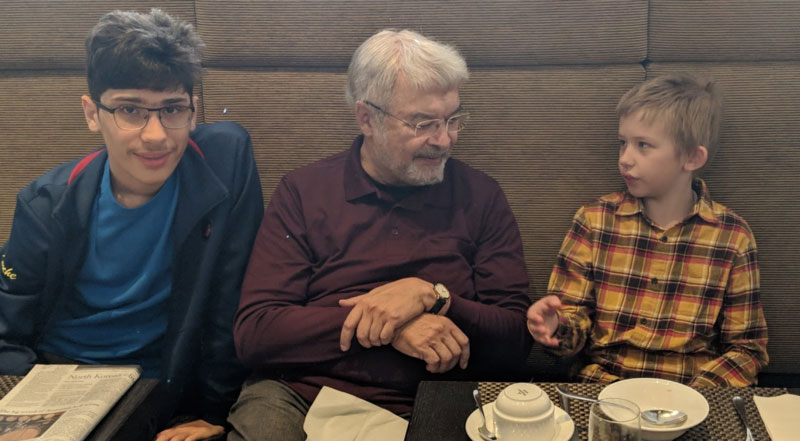
Another young German pre-teen chess talent, Nikolai Nietsche (right). He solved the logical problems extremely well at breakfast in Baden Baden. On the left, also participating, is super-talent Alireza Firouzja. Alireza won the Iranian Chess Championship at age 12 and earned the grandmaster title at the age of 14. He is currently the highest ranked Iranian player and at 16 the youngest (I believe) 2700+ player in the world – another future contender for the World Championship.
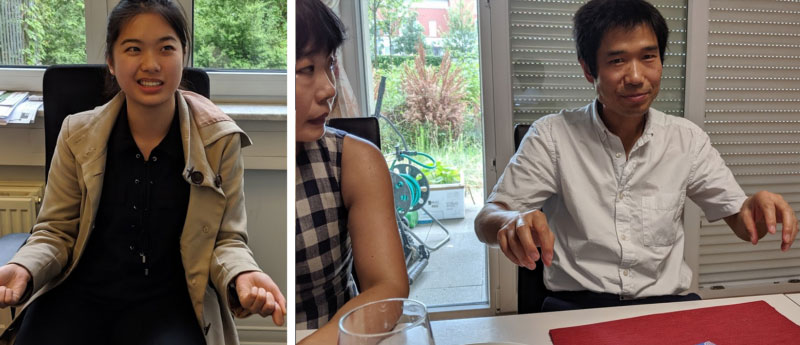
Above is former junior World Chess Champion Qiyu Zhao of Canada, and her parents, both professors. They are all working on the weighing problem. Qiyu is 19 and has written a number of articles for us.
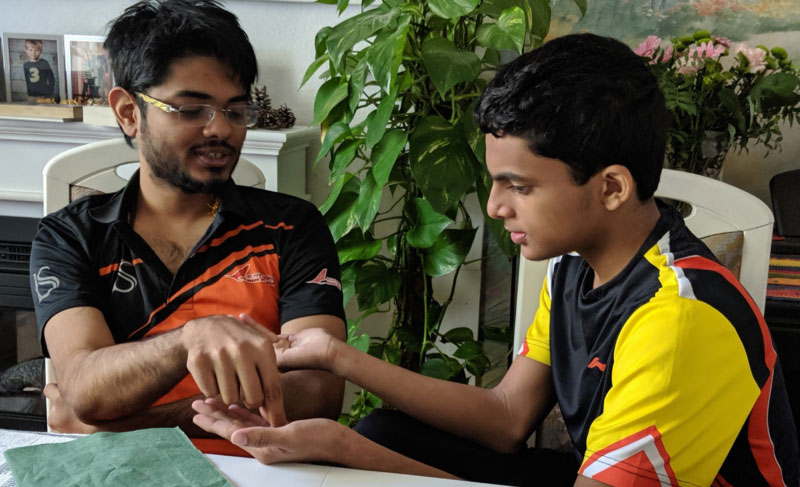
This is an interesting picture: the lad on the right is absolute super-talent Nihal Sarin, fourteen years old, grandmaster, 2600+. He is solving the weighing puzzle in my house, together with his second and teacher, GM Srinath Narayanan, 25, in May this year. Nihal is in my opinion scheduled to take part in World Championship fights in five years at the latest. Stupefying talent for chess.
Okay, now on to some non-chess kids:
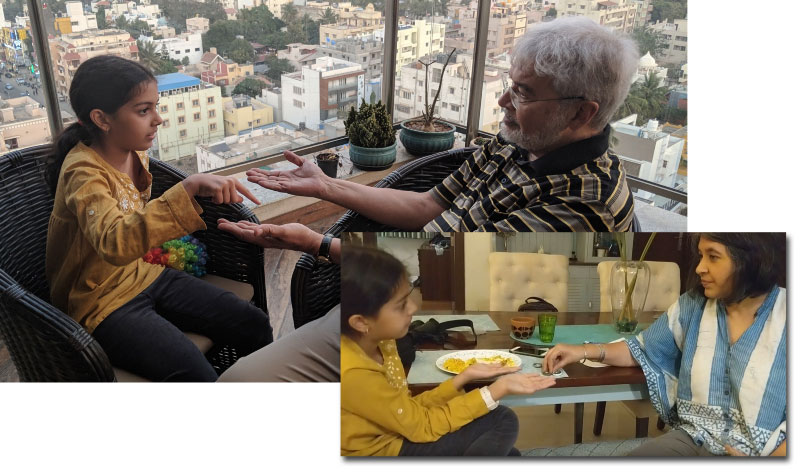
Above is Laila, a nine-year-old super-smart non-chess kid I met in Bangalore. She followed me around at a festive dinner, pestering me for "more puzzles" – with which she could confound her school-teacher aunt.
On a train to Frankfurt and back I was seated across from two kids, whom I recruited for my experiments:
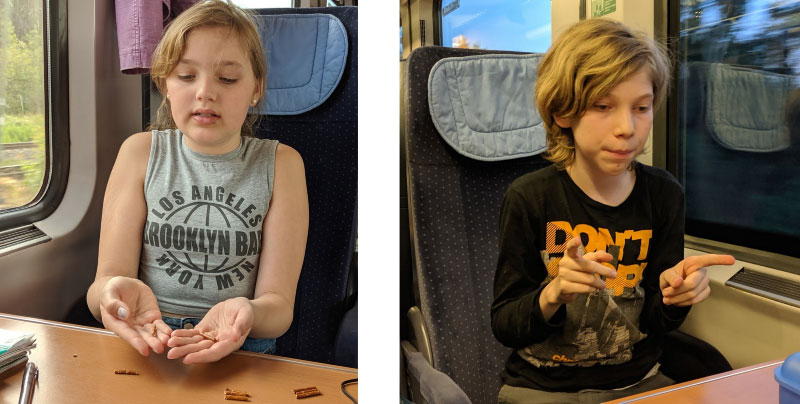
Lilith, on the left, is nine years old and was initially very upset that she had no Internet connection on her iPhone. I gave the sulking girl one logical problem after the other, and she spent well over an hour working on them – without pause or interruption. Occasionally her mother had to admonish her not to scream out in joy when she had found a solution – it startled the other passengers. Twelve-year-old Martin on the right was super-smart and solved my problems much faster than his 28-year-old brother Maximilian, with whom he was travelling. He, too, spent a full hour thinking.
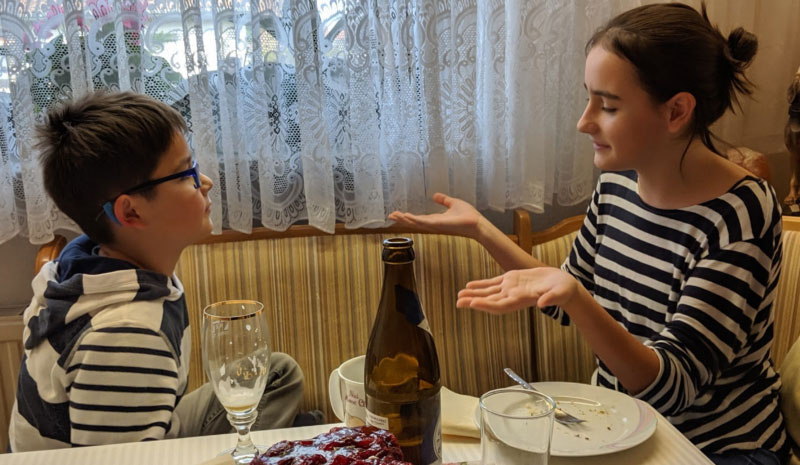
Two young kids, Max and Anne, nine and eleven, close relatives of mine in Bavaria, working on the problem. Max was one of the fastest solvers I have so far encountered.
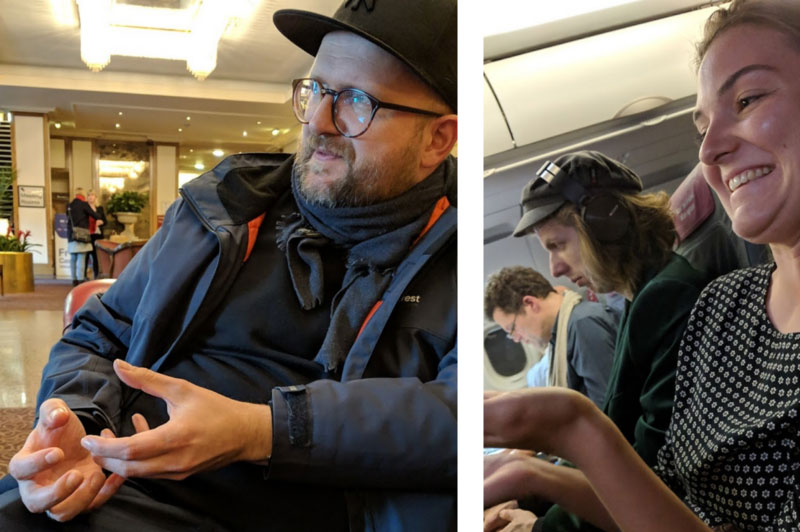
Some grown-ups for a change? On the left is Christian Gödecke, the sports editor of a major German news magazine, Der Spiegel, failing to solve the 27-coin part of the weighing problem. "That's enough for me," he said sullenly, and set off for his hotel in London (we were there for the World Championship match Carlsen-Caruana). Ten minutes later he came rushing back: "I have figured it out!!" And indeed he had. On the right is some random passenger on the plane back home. She has promised to try the problem on the Nigerian school children she is working with in Africa.
It has become clear to me: the standard problem I give my test candidates is very entertaining for kids and adults alike. Never once has anyone lost interest and turned away. However I have, as stated above, not yet reached a conclusion on whether chess players are better at general logical thinking than others. I will report on the results when I have a larger sample – currently less than three dozen. Maybe some readers can help. And: if you are interested I will tell you about the other puzzles we solved in Camp Kramnik in Geneva. It drove these wonderfully talented chess players fairly nuts. Should I do the same to you?
Here is live video of me giving the weighing problems to some of the greatest chess talents in the world. They are Prithu Gupta, 15 years old, P. Iniyan, 16, and R. Praggnanandhaa, 13. All are full GMs and were taking part in a training camp with former World Champion Vladimir Kramnik in France. Watch their faces, especially Pragg's, towards the end, while they are solving the logical puzzles.